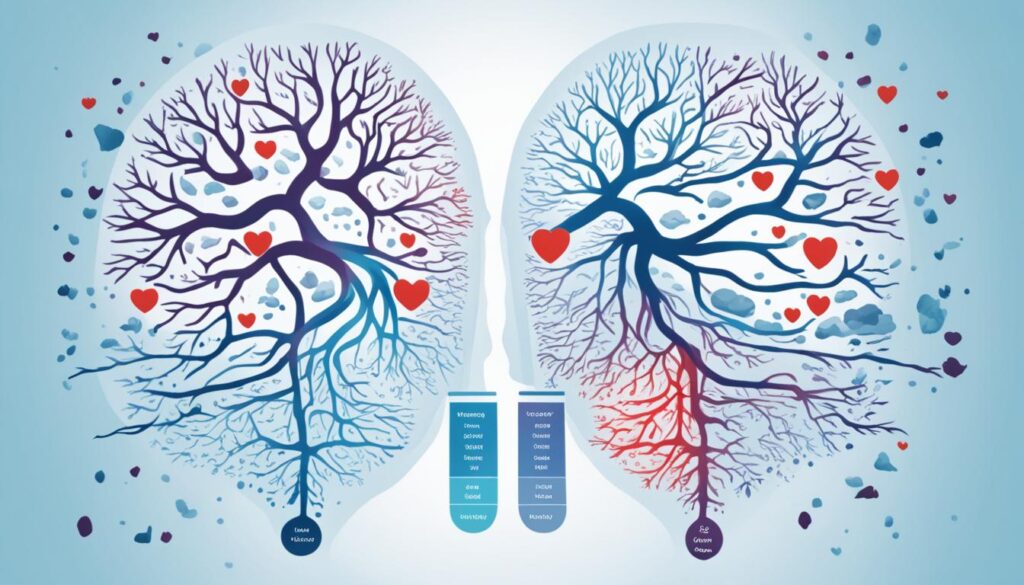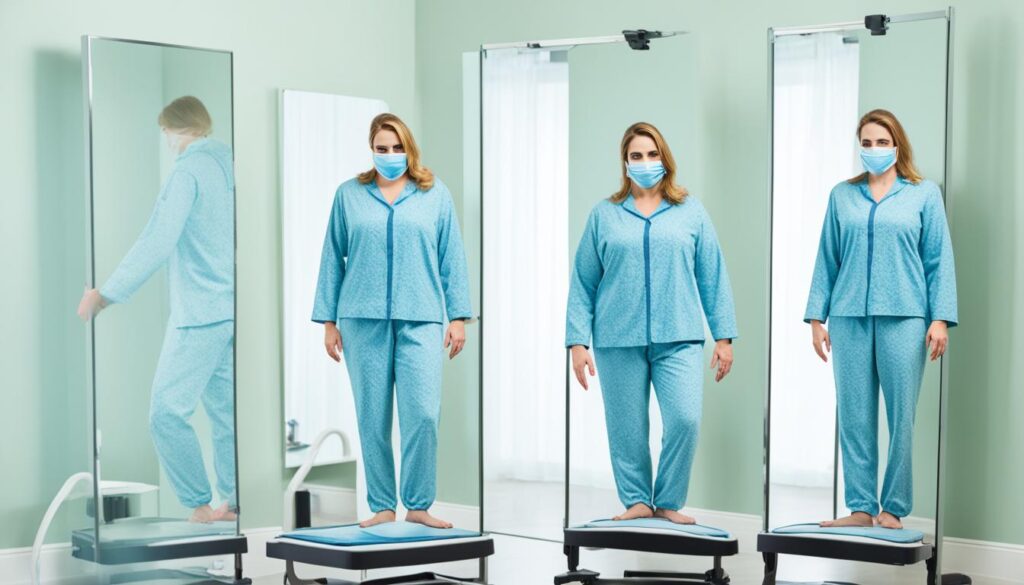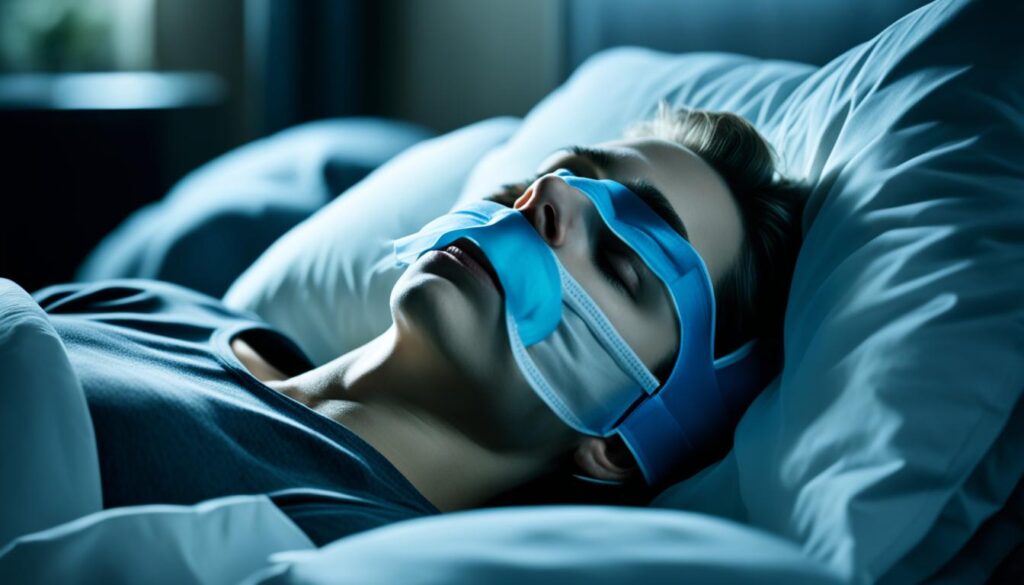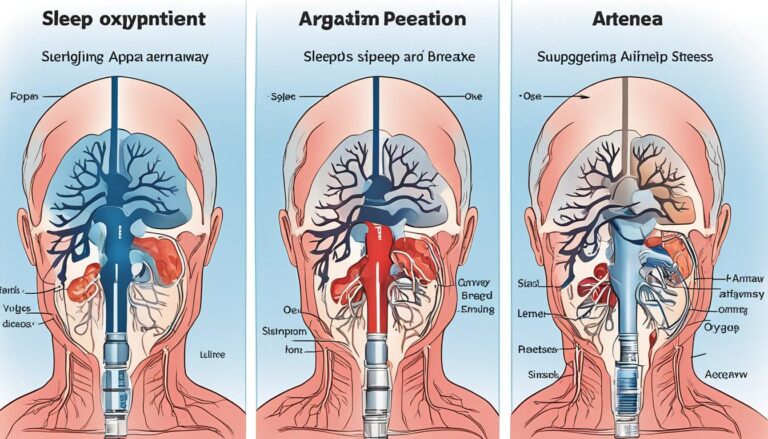Sleep apnea is a sleep disorder that causes breathing to stop and start again many times during sleep. This can really hurt your health. It can lead to health risks of sleep apnea like high blood pressure, heart disease, and diabetes.
Not treating sleep apnea can cause big problems. These problems include cognitive decline and metabolic syndrome. This means your waist might get bigger and your blood sugar levels could go up.
It’s important to know how sleep apnea affects you. Symptoms like feeling tired during the day and having trouble focusing can make life hard. These issues can get worse if you’re not getting enough sleep, as explained by sleep deprivation.
Fixing sleep apnea can make you sleep better. It also helps prevent serious health problems.
Key Takeaways
- Understanding sleep apnea is vital for recognizing its health risks.
- Untreated sleep apnea can lead to serious conditions like heart disease and diabetes.
- Effective management is essential to improve overall health and quality of life.
- Common symptoms include daytime drowsiness, irritability, and cognitive challenges.
- Diagnosis often requires important sleep studies and assessments.
Understanding Sleep Apnea
Sleep apnea is a serious sleep disorder. It means you stop breathing for short periods while you sleep. These pauses can be missed by the person sleeping but are often noticed by their partner. Understanding sleep apnea helps us see how it can affect health and daily life.
About 1 billion people worldwide have sleep apnea. In the U.S., 25% to 30% of men and 9% to 17% of women show signs of obstructive sleep apnea (OSA). This issue is more common in Hispanic, Black, and Asian communities. It also gets worse with age, hitting men and women over 50 equally hard.
Sleep apnea can have big health effects. Being overweight, with a BMI over 35 and a neck over 40 cm, raises your risk. While we don’t screen everyone for it, some groups like drivers and pilots need extra checks.
Testing like nighttime polysomnography (PSG) is best for finding sleep apnea. It shows sleep patterns and breathing stops. This helps doctors start the right treatment. Treatments include losing weight and using devices like CPAP machines.
Knowing about sleep apnea helps us deal with its health effects. It leads to better treatment and improves life quality for those with it.
Types of Sleep Apnea
Sleep apnea comes in three main types, each with its own causes and health effects. The most common is obstructive sleep apnea (OSA). It happens when the muscles in the throat relax too much during sleep, blocking the airway. This leads to pauses in breathing. OSA mostly affects adults, especially men, who are two to three times more likely to get it than women.
Being overweight can make OSA worse because it reduces the space for air to flow. Obesity is a big factor in how severe OSA can be.
Central sleep apnea (CSA) is another type. It happens when the brain and breathing muscles don’t talk to each other right. CSA is more common in people in their middle and older years. Like OSA, men are more likely to get it.
CSA is different from OSA because it doesn’t block the airway. Instead, it’s about not trying hard enough to breathe.
Treatment-emergent central sleep apnea is a type that can happen in people being treated for OSA. This includes those using CPAP therapy. While CPAP helps with OSA symptoms, some people might start having CSA while on treatment.
Knowing the different types of sleep apnea is key to finding the right treatment. This could mean making lifestyle changes, losing weight, or getting specific therapies based on the type of apnea.
| Type of Sleep Apnea | Common Characteristics | Risk Factors |
|---|---|---|
| Obstructive Sleep Apnea | Muscle relaxation leading to airway obstruction | Obesity, male gender, older age |
| Central Sleep Apnea | Brain fails to signal for breathing | Older age, male gender |
| Treatment-Emergent Central Sleep Apnea | Development during CPAP therapy for OSA | Existing OSA diagnosis undergoing treatment |
Common Symptoms of Sleep Apnea
Sleep apnea is often marked by several key symptoms that are vital for early detection. Loud snoring and pauses in breathing during sleep are among the most obvious signs. These signs can be hard to spot, especially since people may not notice them themselves.
Other sleep apnea symptoms include feeling very sleepy during the day. This sleepiness can make daily tasks hard. People may feel tired, irritable, and have trouble focusing.
These sleep issues can also cause headaches in the morning and a dry mouth. Noticing these symptoms is crucial for getting the right help and treatment.
Some might also notice mood changes or waking up gasping for air. It’s key to know that these signs might not be obvious. Spotting them early is a big step towards getting the right treatment.
Sleep Apnea’s Impact on Overall Health
Sleep apnea disrupts healthy sleep patterns, affecting overall well-being. It cuts off the body’s natural sleep cycles. People with sleep apnea don’t get the deep sleep they need for recovery.
How Sleep Apnea Disrupts Restorative Sleep
Sleep apnea causes pauses or shallow breathing during sleep. This leads to sleep disruption. People wake up often, missing out on deep sleep.
This makes them feel unrefreshed. It’s important to know how sleep apnea affects sleep and recovery.
Connection to Daytime Sleepiness and Fatigue
Repeated sleep breaks cause daytime sleepiness. People feel tired, less alert, and their mood changes. This affects daily life, work, and social interactions.
Not treating sleep apnea can lead to brain problems and mood issues. It’s crucial to address sleep apnea’s effects on health.

Health Risks of Sleep Apnea
Obstructive sleep apnea is a common sleep disorder that poses serious health risks. It causes breathing to stop and start again many times during sleep. This can lead to sleep apnea related health issues like feeling very tired during the day, loud snoring, and mood swings that feel like depression. These problems can affect both physical and mental health.
Many factors increase the chance of getting obstructive sleep apnea. These include
- excess weight
- older age
- high blood pressure
- chronic nasal congestion
- smoking
- diabetes
- male sex
- a family history of sleep apnea
- asthma
- narrowed airways
People with obstructive sleep apnea are at higher risk for heart problems. This includes high blood pressure and heart disease. They are also more likely to have heart rhythm issues and strokes. It’s important to understand these risks to manage them well.
Those with obstructive sleep apnea are twice as likely to die suddenly. It can also make recovering from surgery harder and reduce how well medicines work. To manage this, treatments like changing your lifestyle, losing weight, CPAP therapy, and oral appliances are used.
Sleep Apnea Effects on the Cardiovascular System
Sleep apnea is a big risk for heart health because it affects the heart and blood vessels a lot. It’s the most common type, hitting 34% of men and 17% of women. Sadly, over 80% of those with moderate to severe OSA don’t know they have it, leading to big health problems later on. It harms the heart by not giving it enough oxygen.
Link to High Blood Pressure
When people with sleep apnea stop breathing in their sleep, oxygen levels drop. This makes the blood vessels narrow and the heart beat faster and pump harder. Studies show that not breathing well in sleep is linked to high blood pressure. Each time they stop breathing, their blood pressure goes up, making it hard to manage over time.
Increased Risk of Heart Disease
Studies show a strong link between sleep apnea and heart disease. People with sleep apnea are 2-4 times more likely to get heart rhythm problems. They’re also 140% more likely to have heart failure and 30% more likely to have coronary heart disease. This highlights the need for quick diagnosis and treatment of sleep apnea.
Metabolic Consequences of Sleep Apnea
Sleep apnea greatly affects the body’s metabolic functions, leading to serious health issues. It increases the risk of type 2 diabetes and sleep apnea. Studies show that it often causes high blood sugar levels, which is a key part of metabolic syndrome. This includes risks like high blood pressure and bad cholesterol levels.
Association with Type 2 Diabetes
There’s a strong link between obstructive sleep apnea and type 2 diabetes. People with sleep apnea may have trouble controlling their blood sugar, which is bad for their metabolic health. A study found that up to 86.8% of those with sleep apnea struggle with type 2 diabetes.
This is because they often have insulin resistance, a big problem with metabolic syndrome. Not getting enough sleep and not getting enough oxygen can mess up how the body handles sugar, making these risks worse.
Impact on Insulin Resistance
Insulin resistance is a big part of metabolic syndrome and is linked to how bad sleep apnea is. If sleep apnea is not treated, it can make insulin resistance worse, leading to more health problems. Studies show that sleep issues can really affect how the body uses sugar.
For people who are overweight, which often goes with sleep apnea, the risk of insulin resistance goes up a lot.
Fixing sleep apnea issues is key for staying healthy. Making lifestyle changes and getting the right treatment can help lessen symptoms. This can also lower the risks of metabolic syndrome and type 2 diabetes. For more info on how snoring and sleep apnea affect health, check out this resource.
Sleep Apnea Complications in Different Age Groups
It’s important to understand how sleep apnea affects people of all ages. The problems caused by sleep apnea differ a lot between kids and older adults. Each group has its own set of challenges that can affect their health.
Impact on Children
Children with sleep apnea face many issues that can change their daily life and growth. They might act more hyper or have trouble focusing. Not getting enough sleep can also make schoolwork harder for them.
Parents and teachers need to watch for signs of sleep apnea in kids. This way, they can get help early and support their learning and health.
Risks for Older Adults
For older adults, sleep apnea brings even bigger health risks. Studies show that up to 46% of seniors might have it. This can lead to heart problems and make thinking skills decline if not treated.
It’s key to know these risks since many older people might not realize they have sleep apnea. They might think their symptoms are just part of aging.
Dangers of Untreated Sleep Apnea
Sleep apnea affects about 1 billion people worldwide. It’s a serious issue with dangers of untreated sleep apnea that can be life-threatening. Sadly, over 80% of people with sleep apnea don’t know they have it, which increases their risk of health problems.
Not treating sleep apnea can lead to serious health issues. These include a higher chance of heart attacks, stroke, and Type 2 diabetes. People with moderate to severe sleep apnea might even live 10 years less than others.
It can also cause cognitive decline, leading to memory loss and depression. Those with sleep apnea are more likely to get cancer. The link between sleep apnea and heart diseases shows why getting the right treatment is crucial.
Not sleeping well can make you gain weight and increase the risk of metabolic syndrome. This is a group of health problems that can lead to heart disease. This highlights the need to treat sleep apnea for both short-term and long-term health.
| Health Risks Associated with Untreated Sleep Apnea | Details |
|---|---|
| Life Expectancy | Reduced by more than a decade |
| Cardiovascular Diseases | Increased risk of heart attacks and stroke |
| Cognitive Impairment | Memory loss and heightened risks of mental health issues |
| Metabolic Disorders | Association with Type 2 diabetes and obesity |
| Increased Cancer Risk | Potential connection with various cancers |
It’s crucial to address sleep apnea to avoid these long-term health implications and improve life quality. Simple steps, like picking a supportive mattress, can help reduce symptoms and improve sleep. Experts often suggest products that can help manage sleep apnea. For more information, check out recommended mattress options for sleep apnea relief.
The Role of Weight Control in Mitigating Sleep Apnea
Managing weight is key for those with sleep apnea, especially for the obese. A 10% weight gain can make sleep apnea six times more likely. About 60–90% of adults with this condition are overweight.
People with sleep apnea often gain 16 pounds before being diagnosed. This is more than those without it. The more overweight someone is, the higher the chance of obesity-related breathing problems.

Those with sleep apnea and obesity are at higher risk for heart disease. Losing weight is a first step in treating mild sleep apnea. It helps reduce symptoms.
Studies show that weight changes affect sleep breathing. A 2005 study found that moderate weight loss can improve breathing at night. Losing weight can also help with type 2 diabetes and high blood pressure.
| Study Year | Findings |
|---|---|
| 2000 | Association between sleep-disordered breathing and hypertension. |
| 2003 | Look AHEAD trial emphasized weight loss for cardiovascular disease prevention in type 2 diabetes. |
| 2006 | Importance of medical therapy for obstructive sleep apnea reviewed. |
| 2009 | Lifestyle interventions focusing on weight reduction as a primary treatment for mild OSA. |
Working on weight control and sleep apnea management helps with both conditions. It makes sleep apnea less severe and boosts overall health. Fighting obesity is a big step in tackling this tough condition.
Diagnosis and Treatment of Sleep Apnea
The diagnosis of sleep apnea needs a detailed check-up. It often includes sleep studies to watch your body during the night. These studies track your heart, lungs, and brain to spot sleep problems. This helps doctors figure out how bad the condition is and what treatment you need.
Importance of Sleep Studies
Sleep studies are key in finding sleep apnea. They collect data to see how often you stop breathing while asleep. If you stop breathing more than five times an hour, you might need help.
Figuring out why you’re always tired during the day can lead to better sleep and health. Making lifestyle changes can help a lot.
CPAP Therapy and Other Treatments
CPAP therapy is a top choice for sleep apnea. It uses a machine to send air into your airways to keep them open. If CPAP doesn’t work, there are other options like mandibular advancement devices for milder cases.
For severe cases, surgery might be an option. Changing your lifestyle, like losing weight and avoiding alcohol, can also help. These changes can make a big difference for those with mild symptoms.
| Treatment Options | Description | Target Condition |
|---|---|---|
| CPAP Therapy | Delivers air to keep airways open | Obstructive Sleep Apnea |
| Mandibular Advancement Device | An oral appliance that repositions the jaw | Mild to Moderate Sleep Apnea |
| Surgical Options | Includes tissue removal and jaw repositioning | Severe Obstructive Sleep Apnea |
| Lifestyle Changes | Weight loss, avoidance of alcohol, exercise | Mild Sleep Apnea |
Getting the right diagnosis and treatment can make life better and lower health risks. If you’re always tired during the day, you should see a doctor. They can help you find a plan to get better.
For more tips on handling daytime sleepiness, check out ways to get help that fit your needs.
Long-term Health Implications of Sleep Apnea
Sleep apnea has serious long-term health effects that touch many parts of well-being. It often goes hand in hand with chronic conditions, leading to problems that can greatly lower life quality. Studies show a strong link between sleep issues and high blood pressure, pointing to heart risks for those affected.
Research also finds a link to stroke and heart disease, showing how serious sleep apnea can be. Women, especially after menopause, face higher risks. The connection between sleep apnea and chronic conditions is worrying; those with sleep issues are more likely to get diabetes and insulin resistance.
Untreated sleep apnea starts a cycle of health problems that can last a long time. People with severe sleep apnea are more likely to have chronic conditions that affect them all day. This shows the need for good monitoring and treatment to reduce these risks.

Sleep Apnea and Mental Health
Research shows a strong link between sleep apnea and mental health problems. About 25 million Americans have moderate to severe sleep apnea. This can cause up to 30 sleep disruptions each hour. It raises the risk of anxiety, depression, and other mental health issues.
People with schizophrenia are six times more likely to have sleep apnea. This shows why treating sleep apnea is key for both physical and mental health.
High glutamate and low GABA levels in those with sleep apnea harm brain function and emotional control. This can lead to depression symptoms like feeling sad and irritable. Without treatment, sleep apnea can cause daytime tiredness, irritability, and trouble focusing.
This can lead to stress in relationships and emotional ups and downs.
Treating sleep apnea can lessen these emotional problems. Using CPAP therapy, oral devices, or changing habits can help. Adding regular exercise and stress-reducing activities like mindfulness meditation can also improve mental health and sleep.
Working together, healthcare providers can offer a full treatment plan. This includes managing sleep apnea and supporting mental health. Keeping in touch with healthcare teams helps patients deal with the complex issues between sleep apnea and mental health.
Improving Quality of Life with Effective Treatment
Effective treatments for sleep apnea greatly improve quality of life. Most sleep apnea cases are Obstructive Sleep Apnea (OSA), making up 80-90% of all cases. These treatments help patients feel better and sleep more soundly.
People using Continuous Positive Airway Pressure (CPAP) therapy sleep better and feel more energetic. CPAP is a key treatment for serious sleep apnea, keeping the airway open at night. Besides CPAP, other treatments like oral appliances and lifestyle changes also help manage sleep apnea.
Managing sleep apnea reduces health risks like heart disease and stroke. Those who stick with treatment often feel happier and think more clearly. This leads to better daily life, healthier family relationships, and less stress from sleep issues.
Seeing a sleep medicine expert helps get the right diagnosis and treatment plan. This leads to big health gains and a better life for those with sleep apnea.
Conclusion
Sleep apnea is more than just snoring. It can really hurt your health. If not treated, it can lead to serious problems like heart issues, brain decline, and even car accidents. It’s key to know the signs and how it affects your health if you think you might have it.
Handling sleep apnea is very important. The right treatments can make sleeping better and improve your life. Doctors suggest changes in behavior, CPAP therapy, and lifestyle changes to lessen sleep apnea’s bad effects. By taking action, you can get healthier and lower the risk of other health problems like depression and memory loss.
If you have sleep apnea, getting help is crucial for your health. Accepting treatments and making lifestyle changes can boost your mental health, improve your thinking, and reduce the risk of future serious health issues. For more tips on dealing with sleep problems, check out this useful resource.


